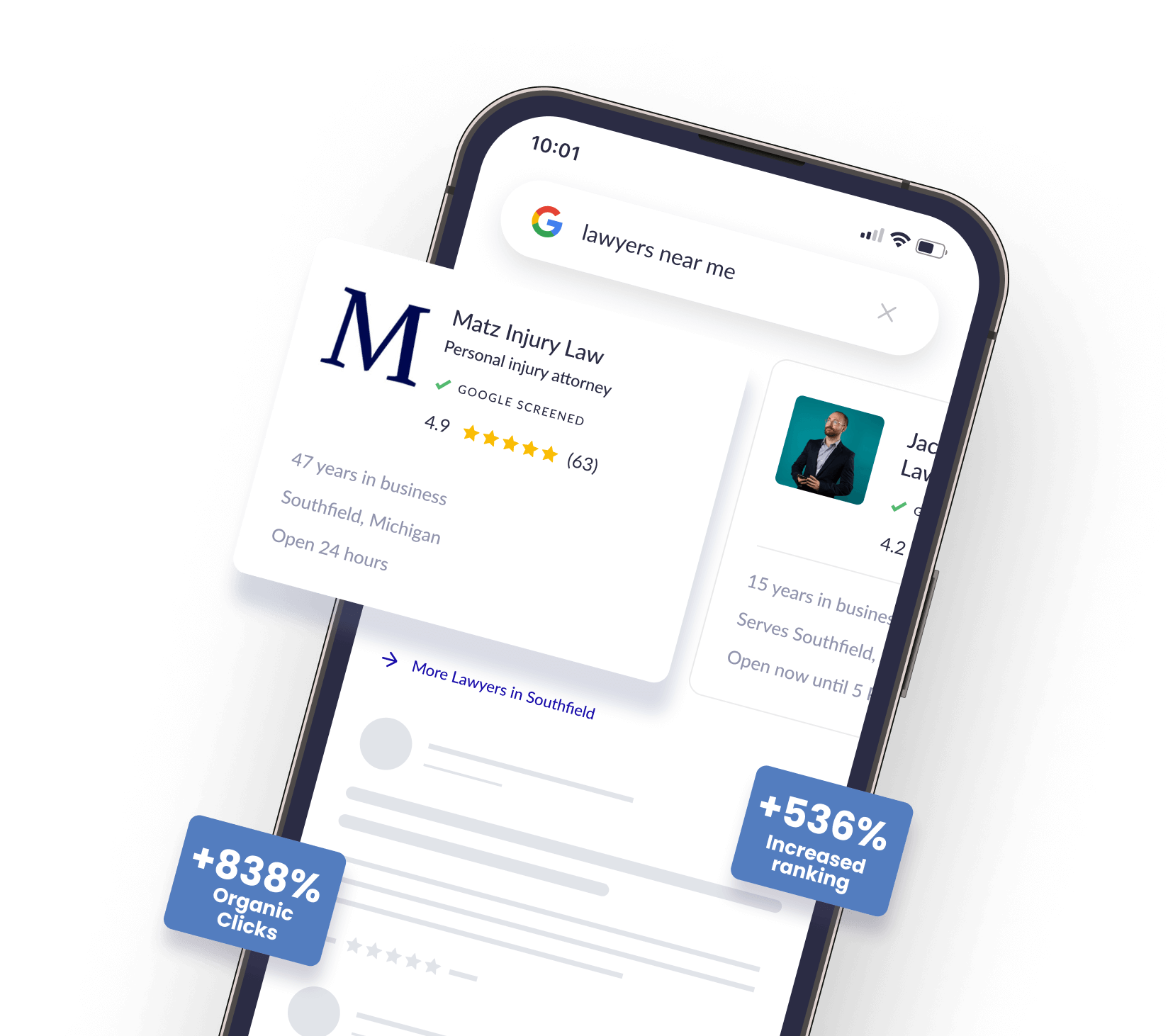Blog
Don’t Break These ABA Marketing Rules

While attorneys excel at navigating the legal world, advertising themselves while remaining compliant with the stringent guidelines of the American Bar Association can be challenging, even for the most talented lawyers. This can easily be uncharted territory for many law firms since it sits outside their area of expertise. The trouble from violating these guidelines can be substantial, leading to reputational and professional damage that is difficult to remediate. Considering how online-oriented modern marketing is, the risk of accidentally violating rules is higher than ever.
Fortunately, your law firm does not have to worry about violating the rules of professional conduct with the help of a specialized legal marketing firm. At Array Digital, you can enjoy the work of professional marketers who have extensive experience navigating the nuanced requirements of marketing the legal profession, letting your firm focus on what you do best while we handle advertising compliance. Engage with our team of professionals to help your online strategies draw the attention you want with lawyer advertising while maintaining legal compliance.
Why do attorneys have marketing rules?
Attorneys can play monumental roles in people’s lives, as handling intense legal matters and lawsuits is no easy feat. Because of this, lawyer advertising rules for such influential services are rigorous to help protect people and ensure that the information about legal services they choose to hire is accurate. For any attorney looking to continue their practice, the American Bar Association’s ethical rules and ethics opinions must be strictly adhered to, or you could face serious consequences.
The core of legal advertising rules is protecting people from misleading or false advertising. Advertising is an essential part of any law firm’s operations, but advertising needs to remain strictly compliant with the ABA’s ideals. Any violations of the rules could lead to fines and suspensions. The worst-case scenario is disbarment, reserved for particularly egregious or repeated offenses.
No false or misleading claims

While avoiding false or misleading statements in advertising your legal services may seem obvious, it is important to understand what the ABA considers false or misleading. Making untruthful claims about your services is, of course, prohibited. Still, it is also forbidden to omit facts that would provide necessary context to otherwise technically true statements. This includes assertions that, while technically accurate, are designed to lead a reasonable person to a certain conclusion that does not have a factual foundation, as explained further in rule 7.1.
One of the most common examples of false or misleading claims is an advertisement that showcases a lawyer’s capabilities on behalf of clients or former clients. You can show a trend, but you cannot imply that any future client will have the same degree of success as former clients. Otherwise, this constitutes guaranteeing results, which is prohibited.
Keep in mind, however, that ads that include certain qualifiers to eliminate unsubstantiated assumptions can be allowed since they remove the chance of a reasonable person coming to an unsupported conclusion.
False or misleading claims include any kind of statement that you would not be able to substantiate objectively. For example, a common error is a law firm claiming they are the best in their practice area (i.e., California’s best criminal defense attorneys). That implies that no other law firm can do what they do, yet plenty of firms exist in the same area of practice.
Another common misleading claim is that clients will get the exact compensation they feel they deserve. The only certainties are death and taxes. In a court case, you never know what the ending will actually be, so it is your professional responsibility not to pretend like you do. Put simply, do not claim that any potential client will get what they deserve unless you can see the future. Fortunately, you can offer to help them get what they deserve without being misleading. You just can’t guarantee it.
Watch your language: words attorney advertising must avoid
Quite a few words are outright prohibited when it comes to legal advertising. According to the ABA’s rule 7.2, claiming to be an expert or a specialist is outright banned due to the ABA’s strict standards on the kinds of lawyers who can call themselves experts. Comparative language is also generally prohibited, as outlined in rule 7.4. Some of this comparative language includes the following:
- Specialist/specialization
- Authority
- Guarantee
- Ensure
- Make sure
- Premier
- Leading
- Top
- Best
- Expert
Keep in mind that this is just a small selection of the words that are generally not used to maintain compliance in legal advertising. Every state’s bar association has slightly differing rules, with some being stricter than others. Fortunately, Array Digital utilizes a comprehensive list of terms to avoid when drafting legal advertising content.
As a disclaimer, labeling yourself an expert or specialist can be problematic in the legal industry because lawyers are required to be formally certified before they can identify as a specialist. If you are officially certified, you can likely mention it in your advertising. If you are not certified, you cannot claim to be an expert even if you have a 20-year career of success in your practice area.
Necessary inclusions
While knowing what to avoid in your advertising is essential, you must also understand what should be included. States will differ on the specifics, but some features almost universally need to be included in all legal advertising materials. For instance, you may be required to identify any piece of advertising content as an advertisement openly. You may also have to include your contact information and other identifying details. Florida specifically, for example, requires advertisements to include at least one lawyer by name in the advertisement in addition to an office address. Ads for providers like lawyer referral services have similar requirements for naming the qualifying provider.
In addition to the necessary inclusions, it’s essential to understand what kind of inclusions you are free to make if you prefer. You can include your rates in some states, while others prohibit it. In some cases, law firm awards can also be displayed among your advertising material, provided they don’t present anything misleading. This is, of course, only applicable in states where posting awards isn’t prohibited entirely.
Using your trade name in marketing
Trade names can be common for law firms, but the legality of using your trade name in marketing can vary depending on where you are. New York, for example, is notoriously strict on the use of trade names. To be clear, a trade name is any name for your law firm other than the name of at least one of the firm’s partners or former partners.
This rule is designed to protect the public from deception. For example, if a law firm was called “The People’s Law Firm of John Smith,” it gives the impression that it is a publicly funded endeavor rather than a private practice. While the exact limitations for trade names will vary based on the state, it is generally safer to simply avoid them altogether and use the partners’ names in the law firm name.
What you need to know about publishing testimonials

Testimonials from previous satisfied clients can carry serious weight for any business, but testimonials for law firms have some extra considerations to keep in mind to maintain compliance. The most important rule to remember, as outlined by the ABA with Rule 7.2 (b), is that anyone giving a testimonial on your behalf must do so on their own accord. They cannot be paid or incentivized for positive reviews or testimonials.
With this rule in place, testimonials are incredibly reliable for future clients, as the only way to get a good one is to do your job well. Even then, however, some state rules prohibit this even further. California, for example, prohibits using testimonials that could suggest that a future client will get the same result as a past client, even if the testimonial claims that it was given freely by a former client. While it is obviously not prohibited for a former client to say that, you cannot use that in your advertising.
It is crucial to remember that the rules against misleading advertising still apply to testimonials. If an endorsement used in your advertising is deceptive in any way, even if you did not choose what the person said, it cannot be used in your advertising. Otherwise, this is considered using misleading and false statements in your marketing, which is patently prohibited.
Do not solicit on your firm’s behalf
Soliciting and advertising are certainly related, but understanding the difference is essential. This is, of course, because advertising is permitted while soliciting is not. Advertising is marketing on behalf of a lawyer or law firm and the available services. On the other hand, soliciting is a kind of advertising that targets a specific group of people or individual people. Any advertising directed towards the general public generally does not qualify as solicitation of clients.
According to Rule 7.3 of the ABA, you will find some exceptions to this typically strict rule. Lawyers are not permitted to solicit their services in person when a primary motive is a pecuniary gain unless one of the three exceptions is met.
- You can solicit a singular person face-to-face if the other person is a lawyer.
- You are also permitted to do this if the person has a familial, close personal, or prior professional relationship with you or your law firm.
- Finally, it is allowed to solicit a person who routinely uses the type of legal services you offer for business purposes.
While the exceptions may leave some room for solicitation, there are ways that even those exceptions do not qualify you to solicit. If the target of your solicitation, for example, has expressed their desire not to be solicited, then you are not permitted to solicit them for your services. Additionally, you cannot solicit anyone, regardless of who they are, if the solicitation involves duress, coercion, or harassment.
Keep records of your advertising
Advertising records are typically kept regardless of rules to make it easier to examine how effective specific ad campaigns are. Still, the legal industry must be thorough regarding their ad records. Keeping records of advertising is a legal requirement in several different states, similar to how you are required to keep client records. Make sure you look at the relevant guidelines for your specific state, as they can vary. New York, for instance, requires you to keep records of your physical ads like direct mail for three years with a similar one-year limit for digital ads.
Talking about the competition
A popular marketing strategy across various industries is to explicitly call out competition to argue that you’ll get the services done better. In accordance with legal requirements, though, it’s generally best to avoid talking about your competition at all as a law firm. Again, the specifics of what is allowed and what is not will vary from state to state, so you will need to check your local regulations, as the FTC has gone so far as to say that comparative advertising is actually beneficial. Of course, the legal industry is treated differently, given its impact on people.
Just because you are unable to talk about your competition directly doesn’t mean you cannot call them out to make your firm look better in a more indirect way. Instead of saying that a competing law firm takes a long time to pick up the phone, you can say that your firm is easy to get in touch with. It is generally best to avoid getting too specific, as specificity can breed suspicion. If a competitor is known for their billboards around town, criticizing the use of billboards in favor of testimonials, for example, may be a little too easy to pick up on.
Remember, advertising on its own exists largely to make you stand out from the competition. The best way to do so with your advertising is to show how well you can fulfill the services people need rather than focusing on what your competitors can’t do. This is known as focusing on your unique value proposition, which lets your service make you stand out among the competition. This is, after all, what most people are going to be looking for anyway. The average person in need of your services is going to care more about how you can help them than how you compare to a competitor.
Information to keep to yourself
While it can be helpful to include plenty of detailed information in your advertising, there are a few pieces of information that you are prohibited from including. Pending case information is generally the most apparent, though it is important to remember that a client’s testimony is considered private as long as they still have pending matters. Their testimony can only be published, provided they gave the testimony freely, if all legal matters they are involved in are resolved.
Many advertising ideas have been tried over the years, including some that involve fake lawyers or firms in advertisements. While it may sound odd, this is explicitly prohibited by the ABA regulations. If you have an idea for an entertaining ad that involves a fake lawyer, keep it to yourself, as the ABA will not be a fan. Of course, fake legal documents cannot be used in your advertisements either.
How is attorney advertising monitored for compliance?

Primarily, the ABA monitors attorney advertising practices since they are the ones setting the standard, but there may be other entities keeping track. Some states have other organizations that put limits on attorney advertising. Washington, for example, has its own compliant law that must be considered separately from the ABA law, though both are in effect.
Advertising can bring tons of clients to your firm (several of our attorneys receive over 200 leads per month), but putting out an ad is like shining a beacon for your competition that lets them know your strategy, albeit in general terms. They may see ad issues as an opportunity to sabotage your efforts. Your clients will not likely notice any compliance issues, but your competition certainly will. You could find yourself with a lawsuit on your hands if you do not remain compliant, as your competition will likely take every opportunity they can get to slow you down.
What happens to attorneys who do not follow marketing rules?
Lawyers who do not comply with advertising model rules will be subject to the same kind of sanctions as lawyers who violate any other practice law. Disciplinary enforcement for lawyers who break the rules tends to express itself in one or more of the following ways.
Disbarment
Arguably, the worst punishment you can suffer for failing to abide by marketing rules is disbarment. This removes your legal right to practice and effectively removes your status as a lawyer, rendering you a nonlawyer.
Suspension
While not as severe as disbarment, you could be suspended from practicing law for a set period. Note that the time suspended cannot exceed a limit of three years.
Probation
Probation still allows you to practice, but your actions will be heavily monitored for the duration of your probation. Typically, probation lasts no more than two years, but your probationary period can be renewed for another two years if deemed necessary.
Reprimand
Reputation plays a significant role in the legal world, and a reprimand is functionally a serious blow to your overall public image. When the court reprimands you, the details of your error and reprimand become a matter of public record. The journal of the state bar and a newspaper that has general circulation around the judicial jurisdictions you practice in publish the details of your reprimand, assigning them to you by name.
Admonition
An admonition is essentially a warning about your behavior. These are typically issued in instances in which no one was hurt by the action or if there is very little likelihood that the error will be repeated in the future. Note that the error will still be published, but it will be attributed to an anonymous lawyer as a way for others to learn rather than attributing it to you by name.
Restitution
If your error led to serious financial loss to the parties involved, you may be on the hook for those losses through restitution to those affected.
Cost Tallying
The cost of disciplinary measures, as in the cost of the court’s time, may also be levied on you should you violate regulations.
Limitation
Lawyers who break the rules may be limited in their ability to practice law in the future. You may be prohibited from a particular field of law or restricted as to the number of cases you can take. The details of a legal practice’s nature or extent of limitation vary based on the individual case.
So, should an attorney even bother with advertising?

Yes, advertising is a key aspect of any business. The legal industry has more regulations to keep in mind throughout the process, but the overall benefit still offers a great deal of potential for increased business. Plenty of people in need of your legal services are out there, and online advertising may be the only way for prospective clients to discover that you exist.
Many of the rules regarding attorney advertising may seem arbitrary or downright ridiculous, but it is a necessary obstacle to hurdle in an effort to get more eyes on the services you have to offer. Fortunately, you do not have to worry about taking care of your advertising on your own. An agency like Array Digital can take on the burden for you while you focus on doing what you do best: protecting and fighting for your clients. As an experienced SEO agency, we can help your advertising campaigns rank higher on search engines while maintaining compliance with regulations and the ABA.
We would argue that maintaining compliance with relevant regulations actually makes it easier to ensure your ads are ethical. After all, the regulations were designed to promote ethics in advertising to begin with. If moral hangups about advertising are getting in the way, you can view the regulations as a way to keep your efforts in check. Whether you agree or not with that notion, the ABA certainly does, and they are the ones you need to stay happy to avoid disciplinary measures.
Keeping your advertising above board
If you plan on outsourcing your advertising efforts to an agency, ensure it knows the requirements for attorney advertising. At Array Digital, we have a dedicated team of legal content strategists and writers with extensive experience working within legal guidelines across numerous states to keep your law firm marketing compliant.
Many agencies are now resorting to AI for content creation, which cuts costs but also cuts quality. This can be incredibly costly in the legal industry, as an AI can easily miss compliance standards that keep your law firm out of trouble. With Array Digital, we fully commit to writers and strategists producing content for humans by humans rather than a computer program.
To facilitate our dedication to quality control, we keep an ongoing writing rule set for every single individual client. That way, feedback can be directly incorporated into content pieces and automatically considered for future content. By looking at the constantly updating rule set before creating content, our writers and strategists can produce better and better content each time. Quality control is everything at Array Digital because we only view marketing efforts as a success if they work for your unique firm.
Our digital marketing services come in multiple forms, and you can get as many or as few as you like for your law firm. We can take care of search engine optimization for both organic and local results in addition to online advertising via Google PPC. Additionally, our website designers are happy to develop your law firm website whether you need an update or are starting from scratch.
If you want to take your law firm’s marketing to the next level, the team at Array Digital is happy to help. Give us a call at 757-333-3021 or fill out our online contact form to get started on your strategy. Let us do all the heavy lifting for you with your law practice marketing so you can focus on offering your new clients the best legal assistance possible.

Everything you need to know about hiring a digital marketing agency:
- The four pillars of digital marketing
- Digital marketing options and costs
- The pitfalls to avoid
- What to expect when working with an agency
- The qualities to look for in a digital marketing agency

Related Digital Marketing Articles
Extraordinary Results
-
“Erik and the Array Digital team are top notch in the digital marketing spaces, particularly for SEO. Their understanding of Google, the algorithms, and the work involved to get websites ranking on the first page is unparalleled. Thank you Erik!!”
Andrew ZihmerZihmer Law Firm -
“I had a chance to consult with Kevin Daisey for my law firm’s marketing needs. He is knowledgeable, kind, and helpful. He provided me with a great marketing analysis. He also invited me to their podcast as a guest speaker. Thank you Array Digital!”
Merve KatiZMK Law -
“The legal profession needs more architects and designers…folks who are thinking about the future of the profession and who are assembling a tribe of like minded lawyer leaders. Erik and his team are certainly ‘that’.”
Ben GlassBen Glass Law & Great Legal Marketing







